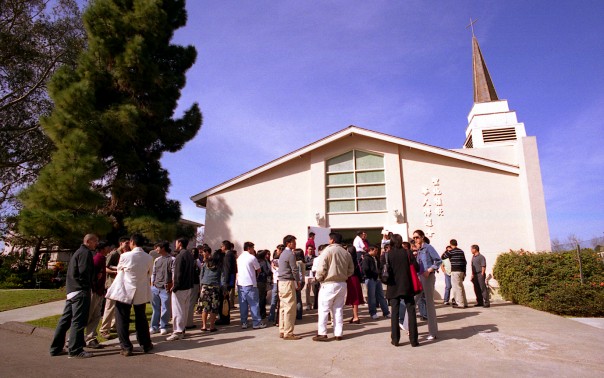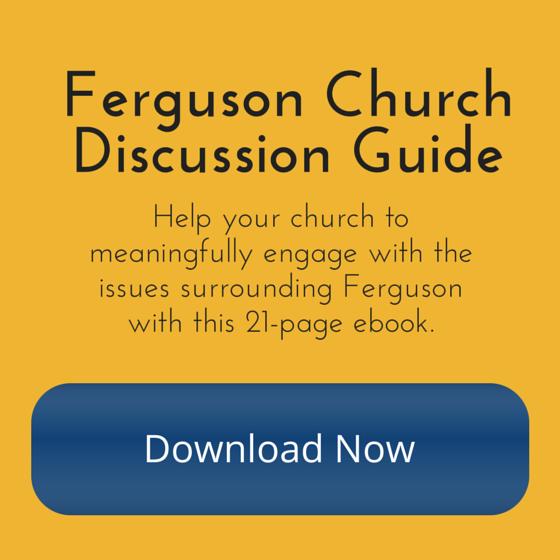
We have been grateful for the permission to host a discussion and prayer gathering at our Chinese immigrant churches. People came with varying degrees of engagement with current events, held differing opinions, and most came to listen. The challenges we faced landed on a few common themes.
At times we were able to address comments immediately, but often had to find better settings to continue the conversation. We’ve provided ways we have been interpreting these themes.
(See: "7 Essential Elements for a Ferguson Discussion at Your Church” for Part 1 of this post.)
Escapism
“The situation in Ferguson is ultimately a sin problem, the gospel will bring peace.”
Our Chinese churches place a high value on doctrine and theology. We’ve experienced the fruit of gospel-centered messages and resources. Yet, retreating to doctrine tended to create more distance rather than connection to recent events. Response to the unrest surrounding Ferguson led many to call this issue a sin problem. Many also referenced that the gospel was what people really needed.
Although we would not disagree with either comments, there was a sense of escapism as people talked generally about sin and the gospel. This article has been helpful in engaging some of those concerns: The Problem of Gospel Escapism in Evangelical Circles by Thabiti Anyabwile.
To question authority runs against the grain of how the culture of our churches function... to not be too political, too angry, too outspoken or else otherwise, disrupt harmony.
Upholding Values of Hierarchy and Harmony
“Let’s pray for officer Darren Wilson.”
At our Chinese immigrant churches, honor and respect are often given to people in positions of authority. To question authority runs against the grain of how the culture of the church functions. Harmony also sits well with our churches, to not be too political, too angry, too outspoken or else otherwise, disrupt harmony. We noticed that a mention of “Black Lives Matters,” quickly turned to a need to respect the side of the police.
Moving forward for more accountability in police operations does require cooperation with the police. But the quickness to empathize and pray for the police revealed not only our value of hierarchy and harmony at all costs, but our positions of privilege as well. As Chinese Americans we face far less current-day incidents of police brutality, racial profiling, and unfair police treatment compared to Black Americans. This privilege and values for hierarchy and harmony make us less likely to criticize the police.
.jpg)
“Aren’t they destroying property?”
One of the responses we got from many in the group were questions about if demonstrations were okay to participate in, especially since there were many examples of looting and destruction of property. Here are some of our responses:
We pointed out that many of the protests have been peaceful, and that many demonstrations (ex. Berkeley) became violent because white anarchists took the opportunity to wreak havoc. However, as a whole they have been peaceful.
If people have concern about temporary violence from protests, we can also invite them to reflect on the prevalent violence on Black lives.
The very fact that there are people trying to take over these protests actually shows the need for Christians to be present to have a larger presence than those who are violent (Ex: UCSD InterVarsity during the demonstrations a few years ago protesting a racist frat party entered into the demonstrations solemnly and orderly wearing the words “PRAY” on their sleeves, to represent a peaceful, Christian partnership in the cause).
How can we be concerned about a few broken windows when this community is mourning the continual pattern of their young men killed while unarmed? Violence from protest are often unproductive, at worst abusive. But if people have concern about temporary violence from protests, we can invite them to reflect on the prevalent violence on Black lives.
 Shame vs. Grace as motivations for justice
Shame vs. Grace as motivations for justice
“Your call to justice seems to be motivated by shame or obligation”
Many second generation Asian Americans brought up this tension. There are many trigger words that bring up unhealthy tension in them, such as “should”, “must”, “responsibility”, “share the burden” and “obligation”. This is possibly from hearing these words in emotionally unhealthy situations with an older generation. Some possible responses:
Emphasize grace and freedom: We were set free from sin so that we could be free to live out our created purpose- to be people of justice and bearers of the shalom of the Kingdom of God.
Especially with immigration exercise (see part 1) be careful of the temptation to turn it into a guilt trip. Emphasize a Christocentric model of justice (we do it because Jesus did it for us and calls us to be like him) vs. a payback model (the black community paved the way for us, so now it’s time to pay back the favor). The payback model works short term but can either turn off second generation East Asian Americans or manipulate broken emotional patterns that they have internalized.